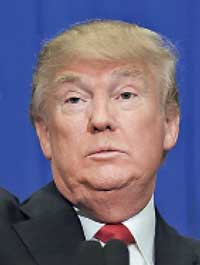16 Nov 2016 - {{hitsCtrl.values.hits}}
 By Ron Huisken
By Ron Huisken
Donald Trump’s emergence as an electable candidate for the US presidency marks the definitive end of the ‘post’ era — that is, post-World War II, post-Cold War, post-unipolar moment. This would have been the case even if Hillary Clinton had won. Trump’s election on November 8 simply added an exclamation point. Through their support for Trump, too many Americans declared that the onerous posture of global leadership that the United States had sustained for 70 years as on balance, in American interests, no longer worked for them.
America’s rise to the top ranks of the international order straddled the end of the 19th and the beginning of the 20th centuries. Washington belatedly joined WWI but quickly went home. It was also drawn into WWII but then concluded that it should remain embedded in Europe to preclude a third round of war. Having also been decisive in the defeat of Japan, the US similarly elected to remain embedded in Asia and strove to engineer long-term transformative change that would preclude major war or the wholesale breakdown of regional order.
These European and Asian strands were fused into the foundations of a global regime intended to foster and protect stability and order, most notably via the NATO, UN, IMF, World Bank and Marshall Plan. The breakdown of relations with the Soviet Union and the perception that a new conflict had been declared — namely between communism and democracy and free enterprise — added further international responsibilities and drove the US to embed itself even more deeply across much of the world.
The United States found itself positioned as the leader of the free world and the defender of all good things: democracy, human rights, non-use of force, non-proliferation of weapons of mass destruction and so on. This was an onerous set of responsibilities — both dangerous and very costly — but US leaders believed it was a construct that served American interests strongly.
The United States tackled this daunting agenda seriously and consistently. Many allies and friends, including Australian leaders, openly volunteered the judgement that the United States played an indispensable role or that, on balance, it was a positive force for international peace and security. And despite the turmoil of the end of the Cold War, the shock of 9/11, the embarrassment of Iraq, the calamity of the Global Financial Crisis and the stunning emergence of China, it appeared that this also remained the judgement of the US electorate.
We now know that this core contract between the elite and the public in the United States has been scrapped. Too many Americans have concluded that the glitter of global leadership is no longer worth the asking price.
It seems unlikely that Donald Trump detected a constituency missed by all other political operators. Far more likely is that that this constituency selected Trump as the most eye-catching vehicle to convey their new sentiments. Even with that in mind, the shift in America’s centre of gravity has not been entirely abrupt or undetectable. The Obama administration has arguably spent most of its eight years trying to reshape America’s global role to respond to both the new distribution of power and influence in the world and to the new political constraints within the United States.
This is not to suggest that America will quietly exit the global stage. On the contrary, the United States will likely remain the most formidable package of hard and soft power on the planet for the indefinite future. China will surpass the United States as the world’s largest economy long before the ‘indefinite future’ arrives, but the Chinese Communist Party’s monopoly on political power and all the ‘characteristics’ associated with that will mean that the international community always sharply discounts China’s
overall standing.
As Washington begins to emit the broad signals reflective of its new domestic political balance, responsibility for the stability and order of the international system must gradually shift to a larger group of countries. It is very unlikely that Washington will be able, let alone inclined, to move so quickly that it would stress the capacities of the international system to adjust. But the other states — especially those that have clamoured so loudly for ‘multi-polarity’ — should ready themselves for an America that is more detached
and selfish.
(East Asia Forum)
(Ron Huisken is an Adjunct Associate Professor at the Strategic & Defence Studies Centre, College of Asia and the Pacific, the Australian National University)
25 Nov 2024 2 hours ago
25 Nov 2024 3 hours ago
25 Nov 2024 3 hours ago
25 Nov 2024 5 hours ago
25 Nov 2024 5 hours ago